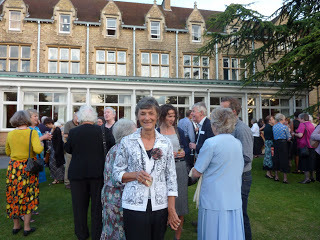Martin Edwards's Blog, page 260
August 23, 2011
Mirage
Mirage is a 1965 film which, I must admit, I'd never heard of before, yet it comes from the same stable as the better known Charade and Arabesque, and is arguably an improvement upon both those movies as a suspenseful mystery. The book on which it was based was written by a notable author, Howard Fast, who wrote various thrillers (that I haven't read) under the name E.V. Cunningham.
Mirage opens with a blackout in a New York skyscraper. David Stilwell (played by Gregory Peck) is accosted by an attractive woman who claims to know him, but he doesn't recognise her. She disappears rather mysteriously, and shortly afterwards he leans that a famous man had plunged to his death from the skyscraper moments earlier.
The plot duly thickens as it becomes clear that Stilwell is suffering from amnesia. What is going on? He hires a private eye, played by Walter Matthau in his inimitable fashion, to find out, but the gumshoe meets an untimely end.
There are hints of Cornell Woolrich style paranoia in the story-line, but the overwhelming influence is that of Hitchcock. Diane Baker, who plays the female lead, is not quite as glamorous as the typical Hitchcock blonde, and more importantly does not play her part in an especially compelling way. Nor does Peck make quite such an impact as Cary Grant at his best. But despite some weaknesses, I thought this was a decent thriller and I'm glad I watched it.
August 21, 2011
St Hilda's

The 18th St Hilda's College Crime and Mystery conference was another triumph for organisers Kate Charles and Eileen Roberts, as well as for Natasha Cooper, who chaired the sessions with the unobtrusive excellence as well as efficiency that seem to come so naturally to her.
I was glad to share a platform with Andrew Taylor, who gave a very good talk about Wilkie Collins - my subject was the British lawyer-author, with special focus on Cyril Hare and Michael Gilbert. Among the highlights of a varied programme, Ayo Onatade gave fascinating insight into the world of the courts, while Val McDermid spoke very interestingly about justice, referring to one of her own excellent thrillers, A Place of Execution. What I didn't know was that the book was inspired by a true crime case - which she learned about from our mutual friend, the true crime expert Douglas Wynn.
As ever, there was the chance to meet pleasant people for the first tme as well as to renew old friendships. I was glad, for instance, to have a chat with Marcia Talley, who is in the foreground in the photo. Marcia is an accomplished American author who is a regular attendee at St Hilda's.
It was a real privilege to be invited to take part, and I'm very grateful to Kate and Eileen for all their hard work. After an excellent but very hectic week, I must admit I was pretty exhausted by the time I was driving home. But it was well worth it.
August 19, 2011
Forgotten Book - The Crime at Black Dudley
Margery Allingham is widely regarded as one of the great British crime writers, but although I like her short stories, I've had mixed feelings about her novels. But I decided to give her another go, and my choice for today's Forgotten Book is the 1929 novel in which Albert Campion made his debut, The Crime at Black Dudley.
In reading the book, it's vital to remember that Allingham was only 23 when she wrote it. The story is breezy, and begins very well, with a pleasingly mysterious ritual in a country house, and murder being done in the dark. But after that, I'm afraid, things fall apart.
A sinister gang commanded by a nasty German hold the house party hostage, and I felt it all became rather silly and tedious. Only when we get back to the main plot do things improve, but vital information is withheld from the reader; it's not really a fair play whodunit at all.
Campion is presented as almost a rogue. Allingham's main focus is on a pathologist called Abbershaw, who does the main detective work. The real merit of this book for modern readers lies not in the story-line but in its historic interest, as the apprentice work of a very interesting and unpredictable writer.
August 18, 2011
A Happy Day


Life has been frenetic recently, but this has certainly been a great and memorable week as far as I'm concerned. With more to come, given that I'm heading off tomorrow for the St Hilda's Crime and Mystery Conference at Oxford, organised by that splendid writer Kate Charles, and Eileen Roberts. It's always a fun week-end. I missed it last year because of holidays, but a couple of years ago I had a terrific three days there. This time I'm giving a talk on 'The British Lawyer-Author'. Val McDermid and Frances Fyfield are among the other speakers.
The trip to Oxford is all the more timely given that this morning was devoted to a trip to my daughter Catherine's sixth form college (once a grammar school, which I attended long ago, but now scarcely recognisable from the 70s buildings). The aim was to learn her A Level results, given that the UCAS website had crashed. Was it an omen? Fortunately not, as she did extremely well and secured her place at Lincoln College, Oxford, to read German and Italian. So I am a proud father, but proud most of all because she has worked hard and deserves the wonderful experiences that should accompany her time as a student. Whatever the media might suggest, not all teenagers are rioting looters, in fact those I know are all very good people: and thankfully they are in the vast majority.
Then it was a mad dash to Southport, to the resort's Flower Show, a major annual event. This year they were featuring books and writers as well as much else besides (which accounted for a burst of 'The Hallelujah Chorus' halfway through our gig.) I shared a platform with Kate Ellis, and we had plenty of books to sign, always good for morale. The photo shows us in the company of another Ellis (no relation). Ron is a crime writer I've known for many years, and he also published one of Kate's books a few years back. Kate, her husband Roger and I than wandered round the Show, which was quite fascinating. The second photo is of one of the show gardens. I do love gardens, and The Cipher Garden may not be the last book I write with a gardening backdrop.
There are times when it seems increasingly difficult to fit in the day job, I must admit! But I remind myself I'm lucky to have these two lives. And this week, also, I've moved office - for the first time in 31 years. As you can deduce, I'm not the most daring and adventurous person in the world! But it's all contributed to a remarkable few days.
August 16, 2011
Writing about Violence
I mentioned on Monday my delight at a very positive review of The Hanging Wood in The Times. I'm equally pleased with a very generous review of the book in The Literary Review. And again it's gratifying that the reviewer, Jessica Mann, is, like Marcel Berlins of The Times, one of the genre's most thoughtful critics. And fascinating – at least to me – that they make very similar points.
This review, which says the book is "an excellent example of the traditional British whodunnit", and is "interesting and enjoyable", makes the point that the story "has all the ingredients: an attractive setting, a dysfunctional posh family and ingenious murder methods, with the violence taking place off-stage."
There is no denying that some of those who die in The Hanging Wood meet their end in a very gruesome ways. There are reasons for this, connected with the nature of the storyline, but I didn't have any wish, when I was writing the book, to salivate over the unpleasantness of what happens. There are certainly some books where graphic descriptions of acts of violence are absolutely necessary, and key to the integrity of the story, but there are other books where, it may be argued, the gore is over-done. Each author has to decide what approach to take, and I don't think there is a "right" or "wrong" approach that can be easily defined. In the end, much is bound to depend on the personal taste of the author and reader.
Is it old-fashioned to write the way I do? I agree with Marcel Berlins that it isn't, and I like to think the books like mine, although written in the detective novel tradition, have plenty to say about contemporary life. But in any event, you can only really write in a way that suits you – chasing after fashion in fiction may work occasionally, but not very often. So I really am heartened when intelligent critics with high standards are sympathetic to my books. Even without reviews, I'd keep on writing, but there is no doubt that the hugely positive reaction to my last novel is helping to motivate me with the follow-up.
August 14, 2011
A Moment to Savour
I've mentioned how difficult it is these days for a writer like me, who is scarcely a bestseller, to get a mention in the review columns of the major national newspapers and magazines. So I was thrilled on Saturday when The Hanging Wood was reviewed in the Times by Marcel Berlins.
And I was even more thrilled by the content of the review. When I say that the other three novelists covered were Mark Billingham, Ruth Rendell, and George Pelecanos, you can see what I mean about bestsellers. It's great company to be in, flattering in itself.
A fortnight ago I told the story of my first bad review. So I hope I can be forgiven, in my delight, for quoting this good review – especially as it raises a couple of wider issues that I'd like to cover in future posts.
"Martin Edwards writes the kind of whodunnits too often labelled, utterly unfairly, old-fashioned – because they do not contain meticulous descriptions of bloodshed, rampant psychopaths or emotionally tormented coppers. The Hanging Wood is the fifth in his Lake District series. A woman whose brother disappeared 20 years ago, when she was seven, tries to persuade the police that their uncle, generally believed to have killed him, is innocent. No one takes seriously. Two days after her final plea, she is found suffocated in a grain silo on her family's farm. Other deaths follow. The main police character, Hannah Scarlett, head of the cold cases section, is appealingly normal; killings take place off-stage; there are many suspects; characters are drawn with insight. A lovely read."
I'll talk about these issues of fashion in crime, and the depiction of violence, on another day. For the moment, I'm not only savouring this review, but getting on with my fiction at last after too long a gap because of day job commitments.
August 13, 2011
Robert Robinson R.I.P.
Robert Robinson has just died, news I was sorry to learn. In my youth, he seemed to be a fixture on TV, often as a quizmaster, but sometimes involved with documentaries. He was also a very regular presence on radio, both on news programmes and the 'Brain of Britain' quiz.
I only came across him once in person, when he was guest speaker at a CWA annual conference. However, one thing that many people didn't know about him was that, at the tender age of 29, in 1956, he published a detective novel, called Landscape with Dead Dons.
Robinson was born in Liverpool (you'd never guess from his accent) and educated at Exeter College, Oxford, where no doubt he had plenty of opportunities to develop the confident and urbane persona that was to become so familiar. His novel is rather in the school of Michael Innes and Edmund Crispin, both of whom lavished praise on it.
As a mystery, it's not exactly The ABC Murders, but it was a high-spirited and amusing debut, and my old green Penguin copy has a blurb which says: 'May he write more.' But although he produced one or two further novels, he never returned to the detective genre, although perhaps he'd have been well suited to it, had he been at work during the Golden Age. So his book remains an agreeable curiosity, a small part of the legacy of a highly successful man.
August 11, 2011
Enid Schantz
I'd intended to cover a forgotten book by Anthony Berkeley today, but I've heard the sad news of the death of Enid Schantz, and so I've decided instead to pay a small tribute to her.
Enid and her husband Tom were American book-dealers, whom I met several times over the years. Charming and considerate people, with a great passion for mysteries. They ran a store called Rue Morgue, although in recent years they focused on online selling.
They also set up an imprint, Rue Morgue Press, which I've mentioned before on this blog, and which specialised in forgotten books - by such unlikely names as Maureen Sarsfield, as well as the better known Pamela Branch. I bought one of their Branch titles recently, when I was last in Oxford.
They also revived the complete works of Dorothy Bowers, a splendid writer, and their research on Bowers' short life was fascinating. When I last met them, they recommended me to try Clyde Clason, a very interesting writer I'd never heard of before. And their research on H.C. Bailey led to my pilgrimage to his home in North Wales a few months back. I tried to persuade them to republish Henry Wade, but alas to no avail; they weren't Wade fans. But if you check the Rue Morgue catalogue, you'll find plenty of little known gems.
Enid was a lovely lady, and I shall miss her, but I'll remember her not just with affection, but with admiration. I only wish I had been able to spend more time in her company.
August 10, 2011
Murder! - review
I have just watched a DVD of an Alfred Hitchcock rarity - a whodunit, rather than a thriller. Murder! was an early talkie from 1930, and it was based on a novel by Detection Club members Clemence Dane and Helen Simpson, Enter Sir John. In the film, Sir John Samaurez, an actor-manager, is renamed Sir John Menier, and is played by Herbert Marshall.
Sir John is a member of a jury which convicts an actress of murdering a colleague. However, he repents of his part in the verdict and sets about finding out what really happened. Suffice to say that the mystery is easily solved, but that there is a memorable finale involving a half-caste transvestite trapeze artist, the kind of character you don't find everyday in crime stories.
Marshall's performance is not very compelling, but the film, despite creakiness, does show us some of the Master's touches at a formative stage in his career. He didn't really care for whodunits, reasoning that they didn't work as well in film as thrillers, and probably he was right.
I haven't read the book, so I'm not sure how faithful the film was to the plot. But Dane and Simpson were interesting characters and I hope to write some more about them in the future. Simpson, by the way, was a very glamorous woman who also became a close friend of Dorothy L. Sayers before her death at a young age from cancer.
The Website
My website has been updated in various respects and my webmaster is aiming to dispense with the rather irritating pop-ups that accompany the webstat program.
There is more information on the Lakes books for readers' groups, as well as more links in relation to e-books. But I'm interested in your views as to whether there are any features or pieces of information missing from the site that would, you think, appeal to readers. If you have any thoughts on this, please do drop me an email.



